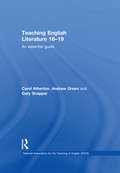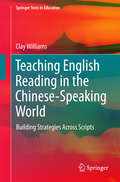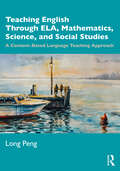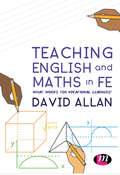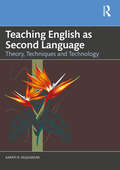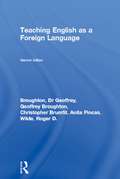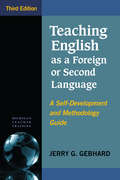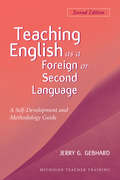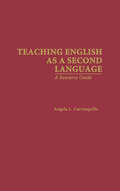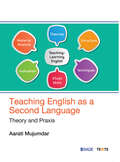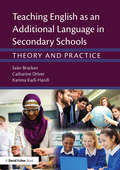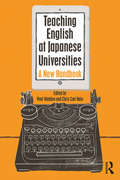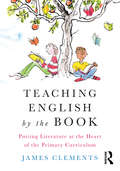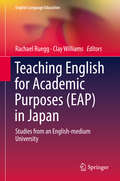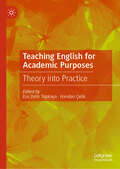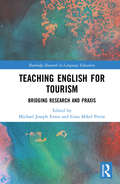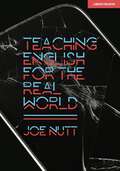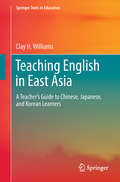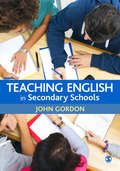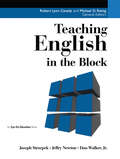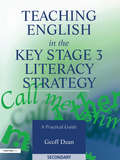- Table View
- List View
Teaching English Learners in Inclusive Classrooms
by Elda DuránTeachers and teacher trainers will find this clear, well-written text to be an invaluable resource in addressing the needs of myriad and unique students, especially those with disabilities.
Teaching English Literature 16-19: An essential guide (National Association for the Teaching of English (NATE))
by Andrew Green Carol Atherton Gary SnapperTeaching English Literature 16 – 19 is an essential new resource that is suitable for use both as an introductory guide for those new to teaching literature and also as an aid to reflection and renewal for more experienced teachers. Using the central philosophy that students will learn best when actively engaged in discussion and encouraged to apply what they have learnt independently, this highly practical new text contains: discussion of the principles behind the teaching of literature at this level; guidelines on course planning, pedagogy, content and subject knowledge; advice on teaching literature taking into account a range of broader contexts, such as literary criticism, literary theory, performance, publishing, creative writing and journalism; examples of practical activities, worksheets and suggestions for texts; guides to available resources. Aimed at English teachers, teacher trainees, teacher trainers and advisors, this resource is packed full of new and workable ideas for teaching all English literature courses.
Teaching English Reading in the Chinese-Speaking World
by Clay WilliamsThis book investigates inherent, structural differences in the Chinese and English writing systems which predispose learners from childhood to develop specific literacy-learning strategies, which can impair later efforts at learning foreign language literacy if the foreign language script varies significantly from the native language script. It compares educational practices and philosophies in Chinese and English-speaking classrooms, and examines the psychological underpinnings of these literacy learning strategies. This book presents psychometric testing of adult reading strategy defaults and examines case study data, revealing that Chinese students are susceptible to misapplying Chinese character-level processing strategies to English word identification tasks, which decreases reading efficiency, and ultimately can lead to learning failure. Finally, a new educational framework is proposed for teaching beginning language-specific word identification and literacy-learning skills to learners whose first language script varies significantly from that of the target language.
Teaching English Through ELA, Mathematics, Science, and Social Studies: A Content-Based Language Teaching Approach
by Long PengAccessible and hands-on, this textbook provides a comprehensive introduction to teaching language through content, an approach known as Content-Based Language Teaching (CBLT). A content-based, language-focused approach to teaching in the disciplines is essential to serving the language and disciplinary needs of English learners (ELs) in the classroom. Guided by learning standards and informed by research, this book demonstrates how content materials in the English Language Arts (ELA), Mathematics, Science, and Social Studies can be harnessed to develop the English language proficiency of ELs as well as advance their disciplinary knowledge and skills. Using content materials in ELA, Mathematics, Science, and Social Studies as a starting point, this textbook illustrates how to teach English as an additional language effectively by integrating language instruction with disciplinary teaching. It showcases numerous learning and instructional activities, complete with targeted language exemplified in sentential and discourse contexts, direct instruction, teacher modeling, guided and individual practices, and assessments, which are further backed up by detailed discussions of their goals, rationales, and implementation. This textbook also features a discussion of differentiation to address the varied needs of students. To further assist readers in determining how to incorporate language instruction, Peng identifies extensive possibilities for language teaching that are based on the same content materials and beyond those targeted by sample learning activities. Each chapter ends with three types of exercises—multiple-choice questions, open-ended discussion questions, and problems of application—to bolster understanding, promote reflection, and encourage application. Complementing the book are additional online resources, including ready-to-use PowerPoints, which are available on the book’s webpage at Routledge.com/9780367521134. Covering key issues such as characteristics of effective language instruction, differentiation, and the challenges associated with CBLT, this is an essential text in TESOL methods and content-area language teaching, as well as an invaluable resource for pre-service and in-service ESL/EFL teachers and content-area teachers who are interested in furthering their students’ language and literacy development.
Teaching English and Maths in FE: What works for vocational learners?
by David AllanThis book is a guide for all teachers in the FE and Skills Sector, regardless of their discipline. It explores how FE teachers can address the mathematics and English needs of all learners, to redress the skills gap that is a current focus. The text explores what works in the sector, examining the barriers to learning and how all learners can be included. It takes a focused look at what works for the vocational learners who have not succeeded in a school setting, and helps tackle the problem of low motivation in learners. The text goes beyond simply providing strategies to follow and includes background theory and detailed case studies to enhance your understanding of different approaches.
Teaching English and Maths in FE: What works for vocational learners?
by David AllanThis book is a guide for all teachers in the FE and Skills Sector, regardless of their discipline. It explores how FE teachers can address the mathematics and English needs of all learners, to redress the skills gap that is a current focus. The text explores what works in the sector, examining the barriers to learning and how all learners can be included. It takes a focused look at what works for the vocational learners who have not succeeded in a school setting, and helps tackle the problem of low motivation in learners. The text goes beyond simply providing strategies to follow and includes background theory and detailed case studies to enhance your understanding of different approaches.
Teaching English as Second Language: Theory, Techniques and Technology
by Aarati R MujumdarThis multidisciplinary volume is a systematic, well-researched resource to help understand the methods and techniques of teaching English as a second language. It integrates theory with praxis, drawing on the Cognitivist–Social interactionist theory and Constructivist approaches adopted in an English classroom. It provides insights into recent trends in teaching, given the changed teaching–learning scenario in education, while simultaneously aiding in the development of the 4IR skills much needed in the 21st century.Written in an easy-to-understand language, the book expounds on various language skills and their application in real-world classrooms. These classroom-tested techniques can be used by teachers by modifying the context in which they are used. The tasks help develop critical-thinking and problem-solving abilities in learners. The techniques and practices elucidated in the book are designed to be accessible to a global readership.This book will be useful to students, pre-service teachers, and researchers, who are new to the teaching of English Language. It will also be an essential companion to practicing in-service teachers and Teacher Trainers to further sharpen their concepts and skills.
Teaching English as a Foreign Language
by Geoffrey Broughton Christopher Brumfit Anita Pincas Roger D. Wilde Dr Geoffrey BroughtonFor the many categories of EFL teachers throughout the world, this book examines the main principles which concern them. By drawing upon their experience the authors have indicated a modern and practical approach.
Teaching English as a Foreign or Second Language, Third Edition: A Self-Development and Methodology Guide
by Jerry G. GebhardLike previous editions, the third edition is an ideal teacher development text for pre-service and in-service EFL/ESL teachers, as well as a guide for those who find themselves teaching English overseas but who do not have a master's in TESOL. This edition has the same three major sections: (1) Self-Development, Exploration, and Settings; (2) Principles of EFL/ESL Teaching; and (3) Teaching Language Skills. New to this edition are:a chapter on digital literacy, technology, and teachingthe addition of technology issues as they relate to the teaching of the various skills in Part 3discussions of task-based teaching, student presentations, how corpus linguistics can inform teaching, metacognitive reading strategies, collaborative writing, assessing writing, and the teaching of grammar.The lists of recommended resources that appear at the end of each chapter have been updated, and all research and pedagogical practices have been revised and updated.
Teaching English as a Foreign or Second Language: A Teacher Self-Development and Methodology Guide, Second Edition
by Gebhard Jerry G.Teaching English as a Foreign or Second Language, Second Edition, is designed for those new to ESL/EFL teaching and for self-motivated teachers who seek to maximize their potential and enhance the learning of their students. This guide provides basic information that ESL/EFL teachers should know before they start teaching and many ideas on how to guide students in the skills of listening, speaking, reading, and writing. It stresses the multifaceted nature of teaching the English language to non-native speakers and is based on the real experiences of teachers. The second edition of Teaching English as a Foreign or Second Language includes a wider range of examples to coincide with a variety of teaching contexts-from K-12 schools, to university intensive language programs and refugee programs. It is also updated with discussions of technology throughout, and it considers ways in which technology can be used in teaching language skills. Sources for further study are included in each chapter and in the appendixes.
Teaching English as a Second Language: A Resource Guide (Source Books on Education #41)
by Angela L. CarrasquilloFirst Published in 1994. Routledge is an imprint of Taylor & Francis, an informa company.
Teaching English as a Second Language: Theory and Praxis
by Aarati MujumdarA systematic and well-researched textbook with a multidisciplinary approach to understand the methods and techniques of teaching English as a second language. This book provides an easy-to-understand and easy-to-apply discussion on language structure, pronunciation, intonation, grammar, and vocabulary through numerous tasks and exercises. The section on "instructional practices" deals with various language skills and their applications in real-world classrooms. With actual classroom-tested techniques, Teaching English as a Second Language: Theory and Praxis would be an ideal companion for BEd students who are in the process of becoming teachers. It would also help practicing teachers who can modify and adapt these techniques and tasks to aid students develop language skills required to face the challenges of the twenty-first century. Key Features • Provides a comprehensive introduction to second language teaching with reference to the recent trends and developments in the area • Enables teachers to adopt a problem-solving approach to teaching English • Uses communicative language teaching (CLT) and task-based teaching methodology, helping learners to develop communication of meaning along with accuracy of form • Dedicated sections on classroom evaluation techniques and use of audiovisual aids and other resources for language teaching
Teaching English as an Additional Language in Secondary Schools: Theory and practice
by Karima Kadi-Hanifi Catharine Driver Seán BrackenWith increasing numbers of learners in secondary schools having English as an additional language, it is crucial for all teachers to understand the learning requirements of these students and plan distinctive teaching approaches to engage and support them. This book provides school leaders, trainee teachers and qualified teachers with the skills and practical knowledge they need to strengthen the learning outcomes of students for whom English is an additional language. Teaching English as an Additional Language in Secondary Schools sets out realistic ways in which EAL learners can be engaged and stretched in their learning, building on their prior literacy, cultural experiences and language learning. It clearly explains the theory and key research into how additional languages are acquired and offers practical classroom teaching and learning strategies to show teachers how they can help EAL learners to access the curriculum and reflect on their learning through assessments. Features include: tasks to help put the ideas into practice case studies illustrating the key challenges faced by EAL learners summaries of key research findings reflections to encourage deeper thinking. Drawing on the daily experiences of teachers and teaching assistants, this book will be essential reading for all trainee and practising teachers that want to ensure students with EAL fulfil their true learning potential.
Teaching English at Japanese Universities: A New Handbook
by Paul Wadden Chris Carl HaleWritten by leading English-language educators in Japan, this Handbook provides an in-depth guide for the new generation of teachers at Japanese universities. In clear, accessible prose, it offers practical and detailed advice on effective classroom pedagogy, student motivation, learning styles, classroom culture, national language policy, career opportunities, departmental politics, administrative mindset, and institutional identity. Its four sections—The setting, The courses, The classroom, and The workplace—examine issues faced by university language teachers as well as challenges confronted by the increasing number of scholars teaching English as a Medium of Instruction (EMI) and Content and Language Integrated Learning (CLIL) courses. Firmly grounded in contemporary teaching method and theory, the Handbook’s 23 chapters also acknowledge the influence of diverse movements such as World Englishes, global issues, gender, and positive psychology. Its three appendices contain information on organizations, books, journals, and websites particularly useful for Japanese university educators; explanation of types and rankings of schools; ways to learn more about individual institutions for job-hunting; and detailed information on the structure (and Japanese titles) of faculty and non-teaching staff at the typical university. This Handbook is an invaluable resource for anyone teaching, or aspiring to teach, at a Japanese university.
Teaching English by the Book: Putting Literature at the Heart of the Primary Curriculum
by James ClementsTeaching English by the Book is about putting great books, wonderful poems and rich texts at the heart of English teaching, transforming children’s attitudes to reading and writing and having a positive impact on learning. It offers a practical approach to teaching a text-based curriculum, full of strategies and ideas that are immediately useable in the classroom. Written by James Clements, teacher, researcher, writer, and creator of shakespeareandmore.com, Teaching English by the Book provides effective ideas for enthusing children about literature, poetry and picturebooks. It offers techniques and activities to teach grammar, punctuation and spelling, provides support and guidance on planning lessons and units for meaningful learning, and shows how to bring texts to life through drama and the use of multimedia and film texts. Teaching English by the Book is for all teachers who aspire to use great books to introduce children to ideas beyond their own experience, encounter concepts that have never occurred to them before, to hear and read beautiful language, and experience what it’s like to lose themselves in a story, developing a genuine love of English that will stay with them forever.
Teaching English for Academic Purposes: Studies From An English-medium University (English Language Education #14)
by Clay Williams Rachael RueggThis book focuses on appropriate English for Academic Purposes instructional concepts and methods in the Japanese context. It investigates a variety of pedagogical techniques, addressing the fundamental academic English skills – listening, speaking, reading and writing – as well as assessment and materials development. All the research included was conducted in Japanese university settings, thus shedding new light on the effective implementation of EAP teaching and learning activities with Japanese learners of English. This book is of interest to anyone working in an EAP context at the secondary or tertiary level, especially those which include Japanese learners.
Teaching English for Academic Purposes: Theory into Practice
by Ece Zehir Topkaya Handan ÇelikThis book offers a helpful resource for English for Academic Purposes (EAP) practitioners, combining theoretical content with in-depth insights rooted in practice. EAP has a key role in preparing students for academic challenges in English-medium universities globally. With the increasing need for proficiency in academic English, there is a demand for a comprehensive resource that caters to instructors who are actively involved in or considering a career in the teaching of EAP. This book addresses this need through five clear thematic sections: the development of EAP practice and pedagogy, creating effective EAP courses, exploring linguistic issues, language skills, and EAP instruction, issues in assessment of learning and practice in EAP, and current perspectives in EAP. The volume features contributions from experts with extensive EAP teaching experience, research backgrounds, and scholarly publications. By drawing on their theoretical understanding and practical insights, the book will equip ELT professionals with essential knowledge, strategies, and practical approaches to tailor their instruction to the unique needs of EAP learners. It will also be of interest to teacher educators, students, and academics researching language teaching in English for Academic Purposes, English for Specific Purposes and English-Medium Instruction contexts.
Teaching English for Tourism: Bridging Research and Praxis (Routledge Research in Language Education)
by Michael Ennis Gina PetrieTeaching English for Tourism initiates a sustained academic discussion on the teaching and learning of English to tourism professionals, or to students who aspire to build a career in the tourism industry. Responding to a gap in the field, this is the first book of its kind to explore the implications of research in English for tourism (EfT) within the field of English for specific purposes. This edited volume brings together teachers and researchers of EfT from diverse national and institutional contexts, focusing on connecting current research in EfT contexts to classroom implications. It considers a wide range of themes related to the teaching of EfT, including theoretical concepts, methodological frameworks, and specific teaching methods. The book explores topics relating to the impact of changing technologies, the need for cultural understanding, and support for writing development, among others. Teaching English for Tourism explores this growing area of English for specific purposes and allows for researchers and practitioners to share their findings in an academic context. This unique book is ideal reading for researchers, post-graduate students, and professionals working in the fields of English language teaching and learning.
Teaching English for the Real World
by Joe NuttSo much of the teaching in schools of how the English works does not prepare students for the real world. So little has changed in exams, the curriculum, or the way people think about English teaching, in several decades. This book is Joe Nutt's attempt to help schools redress that dramatic imbalance. It's not in any sense a practical teaching guide only for English teachers, nor is it full of hints and tips, lesson plans and schemes of work. Teaching English for the Real World is a far wider consideration of what schools and English teachers should be doing if they wish to prepare secondary school children to be successful and effective users of English, in the real world of work, higher education and adult life they will all too soon enter. If you are an English teacher, by the time you finish reading Teaching English for the Real World, you should be better prepared to deliver lessons that those you teach will forever be grateful for. The book consists of four main sections: English in context, towards the GCSE, choosing texts and technology matters. It starts by putting English clearly into context through a range of current examples. It urges teachers to consider the complex role English usage plays on everything from the side of a bus, through tissue-thin social media, garish slideshows and perky TED talks, to the hundreds of pages of research or official reports so often used as the basis for serious political policy and commercial decision making. It will then examine the classroom status quo and instead of the unrealistic and damaging focus on experiment and creativity, instead of requiring them to write newspaper articles, stories or speeches, the main deliverables in any English GCSE exam, the book will argue that teachers should think carefully about how to connect what children write, with who they are and where they really want to publish. The next section deals with choices of texts. There is a place for children to be taught to write well by example, but there are challenging questions to ask about much of the material routinely chosen. How often are texts and authors selected for study, for reasons that have absolutely nothing whatsoever to do with knowledge or linguistic skill, and everything to do with politics? Even exam boards are guilty of this. The final section examines the relationship between English and the technology real people use to produce it. It reflects on how technology has impacted on the quality of the reading experience itself and argue that there is a crisis in reading in secondary schools, with many children sailing through exams yet leaving school as disinterested and even poor readers. And it suggests how teachers might approach introducing these different risks to children and equip them best to make sound judgements about the way they write and communicate, for personal and employment purposes in adult life.
Teaching English for the Real World
by Joe NuttSo much of the teaching in schools of how the English works does not prepare students for the real world. So little has changed in exams, the curriculum, or the way people think about English teaching, in several decades. This book is Joe Nutt's attempt to help schools redress that dramatic imbalance. It's not in any sense a practical teaching guide only for English teachers, nor is it full of hints and tips, lesson plans and schemes of work. Teaching English for the Real World is a far wider consideration of what schools and English teachers should be doing if they wish to prepare secondary school children to be successful and effective users of English, in the real world of work, higher education and adult life they will all too soon enter. If you are an English teacher, by the time you finish reading Teaching English for the Real World, you should be better prepared to deliver lessons that those you teach will forever be grateful for. The book consists of four main sections: English in context, towards the GCSE, choosing texts and technology matters. It starts by putting English clearly into context through a range of current examples. It urges teachers to consider the complex role English usage plays on everything from the side of a bus, through tissue-thin social media, garish slideshows and perky TED talks, to the hundreds of pages of research or official reports so often used as the basis for serious political policy and commercial decision making. It will then examine the classroom status quo and instead of the unrealistic and damaging focus on experiment and creativity, instead of requiring them to write newspaper articles, stories or speeches, the main deliverables in any English GCSE exam, the book will argue that teachers should think carefully about how to connect what children write, with who they are and where they really want to publish. The next section deals with choices of texts. There is a place for children to be taught to write well by example, but there are challenging questions to ask about much of the material routinely chosen. How often are texts and authors selected for study, for reasons that have absolutely nothing whatsoever to do with knowledge or linguistic skill, and everything to do with politics? Even exam boards are guilty of this. The final section examines the relationship between English and the technology real people use to produce it. It reflects on how technology has impacted on the quality of the reading experience itself and argue that there is a crisis in reading in secondary schools, with many children sailing through exams yet leaving school as disinterested and even poor readers. And it suggests how teachers might approach introducing these different risks to children and equip them best to make sound judgements about the way they write and communicate, for personal and employment purposes in adult life.
Teaching English in East Asia
by Clay H. WilliamsThis book investigates the current EFL market in East Asia, focusing on K-12, university, and cram school English education in Japan, China, and Korea. It explores prevailing educational practices by both Asian learners and teachers of English, contrasting them with Western practices, and illuminating why Western pedagogical methods have often encountered tremendous resistance from teachers, administrators, parents, and students in the East Asian classroom context. After establishing this cultural contrast of pedagogical norms, the book presents a series of practical means for adapting Western teaching practices and philosophies to better suit the learning styles of East Asian students and the cultural context and practical realities of the East Asian classroom, offering both Western teachers working in East Asia and native East Asian teachers realistic plans for turning theory into successful practice. These plans are divided by subsections, focusing on the linguistic subskills being taught: listening/speaking, reading, and writing. Each section includes two contrasting lesson plans to demonstrate how the educational theories and practices promoted by the author can often be implemented by making relatively simple changes to existing practices that incorporate a fuller understanding of how to actively assist students in developing new learning styles and behaviors.
Teaching English in Secondary Schools
by John GordonThis book is an indispensable guide for anyone training to become a secondary English teacher. It provides an overview of the main topics taught in schools, informed by good teaching practice drawn from the classroom and supported by research and theory, and engages with the requirements of the 2014 National Curriculum for England. Each chapter is based around a ‘lesson feedback’ case study informed by real classroom observations combined with research findings to explore and analyse what underpins high quality English teaching. Coverage includes: · Encouraging a love of reading in your classroom · How to teach effective writing for pleasure and for information · Developing students’ grammar, vocabulary and spoken English · Inspiring teaching using drama, poetry and Shakespeare · Intelligent use of media and new literacies in teaching This is essential reading on all secondary English initial teacher education courses, including school-based (SCITT, School Direct, Teach First), university-based (PGCE) and employment-based routes into teaching.
Teaching English in Secondary Schools
by John GordonThis book is an indispensable guide for anyone training to become a secondary English teacher. It provides an overview of the main topics taught in schools, informed by good teaching practice drawn from the classroom and supported by research and theory, and engages with the requirements of the 2014 National Curriculum for England. Each chapter is based around a ‘lesson feedback’ case study informed by real classroom observations combined with research findings to explore and analyse what underpins high quality English teaching. Coverage includes: · Encouraging a love of reading in your classroom · How to teach effective writing for pleasure and for information · Developing students’ grammar, vocabulary and spoken English · Inspiring teaching using drama, poetry and Shakespeare · Intelligent use of media and new literacies in teaching This is essential reading on all secondary English initial teacher education courses, including school-based (SCITT, School Direct, Teach First), university-based (PGCE) and employment-based routes into teaching.
Teaching English in the Block (Teaching In The Block Ser.)
by Dan Walker, Jr Jeff Newton Joe StrzepkProvides detailed instructional strategies, sample lesson plans, and sample assessments which can be adapted in your classroom to help create better readers and more effective writers.
Teaching English in the Key Stage 3 Literacy Strategy
by Geoff DeanThis book will supplement the training currently being offered to all secondary English departments. It offers a view of the place of the English 'strand' in the overall Key Stage 3 strategy and gives support to English departments in their preparations for a new way of working. It will encourage English teachers to review their current schemes of work, offering suggestions for more substantial teaching and learning modules, as well as practical ideas for classroom use and recommended resources. The book interprets and explains the NLS document for busy practitioners; reinforces the messages of the National Literacy Strategy (NLS); spells out the expectations of the framework and offer guidance on how to fulfil them; and describes and explains the types of teaching methods to improve students' learning. This book includes many practical ideas for classroom activities and offers direct support for the less confident English teacher. The book is equally valuable to students and practicing teachers.

